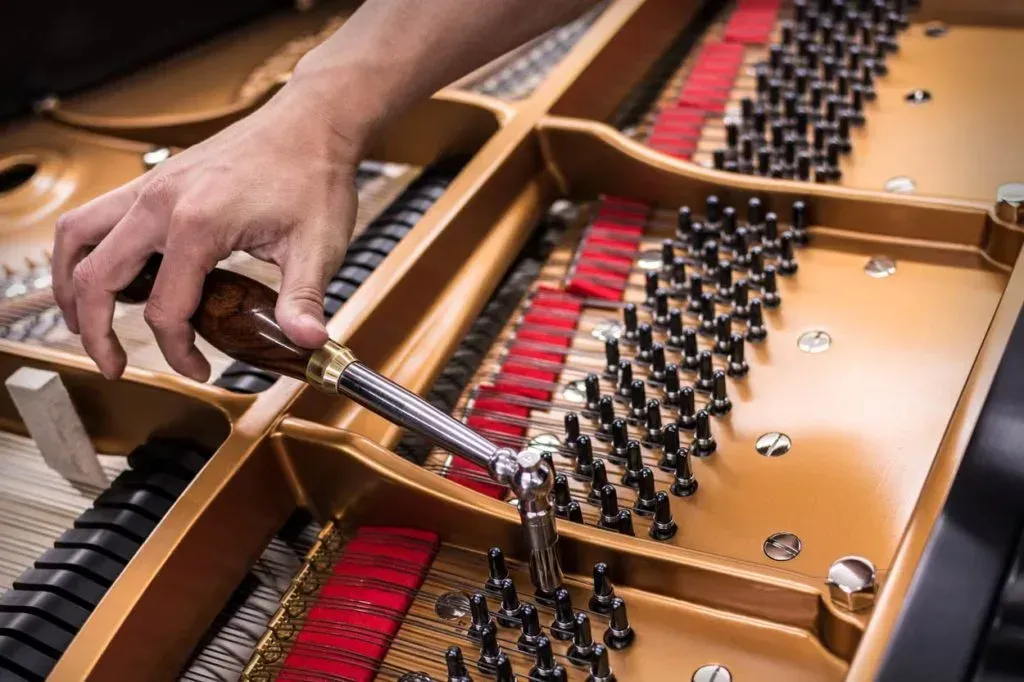The secrets of piano tuning and why it's essential for optimal sound and longevity, explained by an accomplished concert pianist.
I'll never forget the time I was performing Rachmaninoff's Piano Concerto No. 2 at Bridges Hall of Music. The energy was electric, the audience was rapt, and I was lost in the music. But as I launched into the soaring melodies of the second movement, something felt… off. The once-familiar harmonies sounded discordant, the notes clashing instead of blending. It was like a subtle but persistent itch I couldn't scratch.
It turned out that the piano, despite being a magnificent Steinway, had slipped slightly out of tune due to the hall's fluctuating temperature. A quick touch-up by the piano technician during intermission transformed the instrument, and the second half of the concerto soared with the brilliance it deserved.
That experience taught me a valuable lesson: tuning isn't just about pitch; it's about achieving the full potential of your instrument and ensuring a truly harmonious musical experience.
Just as a finely tuned engine runs smoothly, a well-tuned piano sings with clarity, resonance, and expressiveness. But what exactly is tuning, and why do pianos need it so often?
In the simplest terms, tuning involves adjusting the tension of the piano's strings so that they vibrate at the correct frequencies, producing the desired pitches. This seemingly simple task is actually a delicate art, requiring a keen ear and a deep understanding of the instrument's mechanics.
In this article, we'll look at the reasons pianos go out of tune, the signs that your instrument needs attention, and the many benefits of regular tuning.
Why Pianos Go Out of Tune
To truly understand why pianos require regular tuning, it's essential to grasp the forces at play within this magnificent instrument. Imagine over 20 tons of pressure exerted on the cast iron frame by the combined tension of the strings—it's a marvel of engineering and physics. However, this immense pressure also contributes to the piano's tendency to lose its pitch over time.
The Science Behind String Tension
Each of the piano's roughly 230 strings is wound around a tuning pin and held under considerable tension. This tension is what allows the strings to vibrate and produce sound when struck by the hammers. But even the finest steel strings are susceptible to subtle stretching and relaxation, especially when subjected to constant stress.
Think of it like a stretched rubber band—over time, it loses some of its elasticity and doesn't quite snap back to its original shape. Similarly, piano strings gradually lose tension, causing the pitch to drop slightly. Even a tiny change in tension can have a noticeable impact on the sound, making the instrument sound dull, lifeless, or out of tune.
Environmental Factors
While string tension is a primary factor, environmental conditions play a significant role in accelerating the detuning process. Humidity fluctuations are a major culprit.
Wood, a key component of the piano's soundboard and other structural elements, absorbs and releases moisture in response to changes in humidity. This expansion and contraction can alter the tension on the strings, pulling them out of tune.
Temperature changes can also affect the piano's tuning. As the temperature rises, the metal frame expands, subtly altering the tension on the strings. Conversely, as the temperature drops, the frame contracts, potentially causing the pitch to rise.
While these changes may seem minuscule, they can accumulate over time and lead to noticeable detuning.
Usage and Age
The frequency with which a piano is played can also influence how often it needs tuning. The more you play, the more the strings vibrate, accelerating the natural process of stretching and relaxation.
Older pianos, with well-worn components and less stable tuning pins, are particularly susceptible to going out of tune.
In essence, a piano is a dynamic instrument, constantly reacting to the forces acting upon it. Understanding these forces is key to appreciating why regular tuning is an indispensable part of piano ownership.
Signs Your Piano Needs Tuning
As a concert pianist, I've developed a keen ear for the nuances of pitch. Even the slightest deviation from perfect tuning can be jarring, like a sour note in a beautiful melody.
But you don't need to be a professional musician to tell when your piano needs a tune-up. Here are some telltale signs that your instrument is yearning for the harmonious touch of a skilled technician:
The Unmistakable "Sour Notes"
The most obvious sign that your piano needs tuning is the presence of "sour notes." These are notes that sound noticeably sharp (higher) or flat (lower) than they should. As you play through a scale or melody, these out-of-tune notes will stick out like a sore thumb, disrupting the flow of the music and causing a sense of unease.
Intervals and Chords Sound "Off"
Another indicator of detuning is dissonance within intervals and chords. When two or more notes are played together, they should create a pleasing harmony.
However, if the piano is out of tune, these harmonies can sound muddy, harsh, or simply "off." This dissonance can be particularly noticeable in complex chords or intricate passages where multiple notes are sounding simultaneously.
Difficulty Playing In Tune with Other Instruments or Recordings
If you find it difficult to play in tune with other musicians or recordings, it could be a sign that your piano needs tuning. This is especially true if you're playing with instruments that are not easily tunable, like woodwinds or brass. Even a slight discrepancy in pitch can make it challenging to blend with other instruments or match the pitch of a recording.
Visual Cues
In some cases, you may be able to see visual signs that your piano needs tuning. If the tuning pins (the metal pins that hold the strings) appear loose or if you notice any broken strings, it's definitely time to call a technician.
While these are the most common signs, it's important to note that even subtle detuning can impact the overall sound and playability of your piano.
If you're unsure whether your piano needs tuning, it's always best to consult with a qualified technician. They can assess the condition of your instrument and make recommendations based on their expertise and your individual needs.
How Often Should You Tune Your Piano?
As a concert pianist, my piano is tuned before every performance, sometimes even multiple times a day if the concert hall's conditions are particularly challenging. But for most piano owners, such frequent tuning isn't necessary. So, how often should you tune your beloved instrument?
The General Rule of Thumb
The general rule of thumb is to tune your piano at least twice a year. This bi-annual tuning helps to maintain consistent pitch and ensures that your piano always sounds its best. It also allows a technician to address any minor issues before they become major problems.
Factors That Influence Frequency
However, there are several factors that can influence how often your specific piano needs tuning:
- Climate: If you live in an area with extreme temperature fluctuations or high humidity, your piano may require more frequent tuning. The constant expansion and contraction of the wood can put extra stress on the strings and tuning pins.
- Usage: The more frequently you play your piano, the faster it will go out of tune. Professional musicians who play for hours each day may need to tune their pianos monthly or even weekly.
- Piano Age: Older pianos tend to require more frequent tuning than newer ones. This is because the tuning pins and other components may become worn over time, making it more difficult to hold a stable pitch.
New Pianos: A Special Case
New pianos are a bit of a special case. During the first year, the strings stretch and settle, so it's recommended to tune a new piano four times within the first year to help it adjust to its new environment.
A Word of Caution
While it's important to tune your piano regularly, it's equally important not to wait until it sounds terribly out of tune. The longer a piano remains out of tune, the more difficult it becomes to bring it back to pitch. This can put extra stress on the strings and tuning pins, potentially leading to damage.
In general, it's best to schedule regular tunings with a qualified technician. They can assess the condition of your piano and recommend a tuning schedule that's right for your specific instrument and playing habits.
Remember, a well-tuned piano is a happy piano, and a happy piano will reward you with years of beautiful music.
The Benefits of Regular Tuning
While the reasons for piano detuning might seem like a symphony of chaos, the benefits of regular tuning are a harmonious melody of advantages for your instrument and your musicianship. Let's explore why investing in consistent tuning is a decision you won't regret.
Optimal Sound Quality: A Symphony of Clarity
The most immediate and obvious benefit of a well-tuned piano is the sheer joy of its sound. When every note rings true, the harmonies shimmer, and the melodies soar, it's an auditory feast that elevates your playing experience and captivates your listeners.
A tuned piano sings with clarity, resonance, and warmth, allowing the full spectrum of emotions within the music to shine through.
Longevity and Value
Beyond the aesthetic pleasure, regular tuning is an act of preservation. By keeping the strings at their proper tension, you reduce the stress on the piano's frame, soundboard, and other components. This helps to prevent costly repairs down the line, such as cracked soundboards or broken strings.
Furthermore, a well-maintained piano holds its value better than a neglected one. Should you ever decide to sell or upgrade your instrument, potential buyers will be more attracted to a piano with a documented history of regular tuning.
Improved Learning Experience
For beginners, a tuned piano is an invaluable learning tool. Developing a keen sense of pitch is crucial for any musician, and practicing on an out-of-tune instrument can hinder this development. A well-tuned piano provides a reliable reference point, helping beginners train their ears and develop accurate intonation.
Preventing Costly Repairs: A Stitch in Time Saves Nine
As mentioned earlier, neglecting tuning can lead to a host of problems, including broken strings, cracked soundboards, and even damage to the piano's frame. These repairs can be expensive and time-consuming, not to mention the frustration of having your beloved instrument out of commission. Regular tuning is a preventative measure that can save you from these headaches down the road.
In conclusion, tuning your piano is not merely a technical necessity, but an investment in the instrument's health, longevity, and the joy it brings to your life. It's a testament to your appreciation for music and your commitment to the craft.
As I prepare to step onto the stage for my next performance, I know that the harmonious sound of my piano is not merely a result of my own skill but also a testament to the meticulous care and tuning it receives. Tuning is an act of love, a commitment to preserving the integrity of your instrument and ensuring that it sings with its fullest voice.
Whether you're a professional musician, a passionate amateur, or a proud piano owner, don't underestimate the transformative power of a well-tuned instrument. It elevates your playing experience, inspires your creativity, and ensures that your musical journey is always in harmony.
So, if you haven't scheduled a tuning in a while, or if you've noticed any of the telltale signs of detuning, I urge you to reach out to a qualified piano technician. Let them work their magic and restore your piano to its rightful state of sonic splendor. Remember, a harmonious piano is a happy piano, and a happy piano is a gift that keeps on giving, filling your life with music and joy.





Comments ()